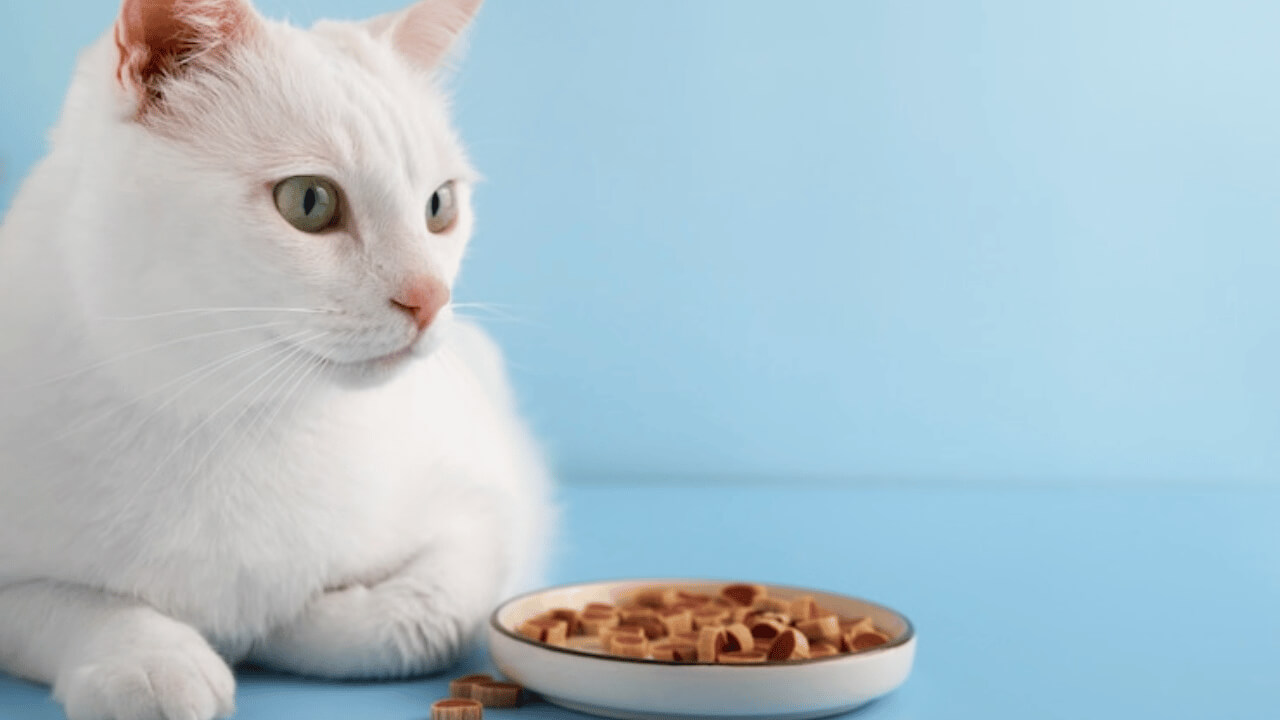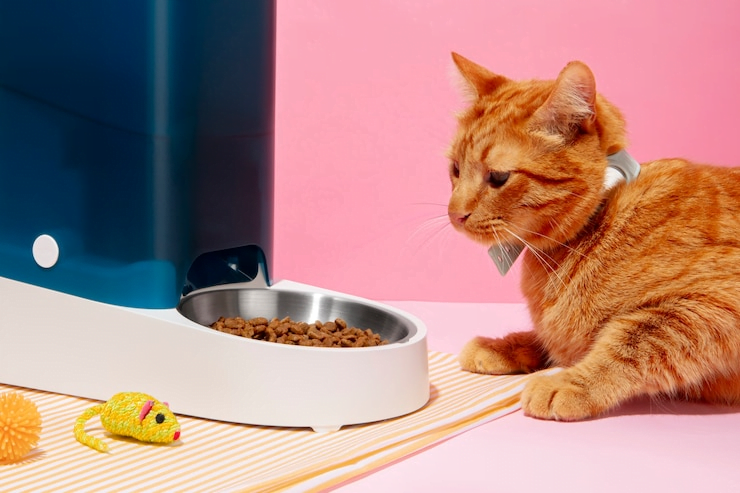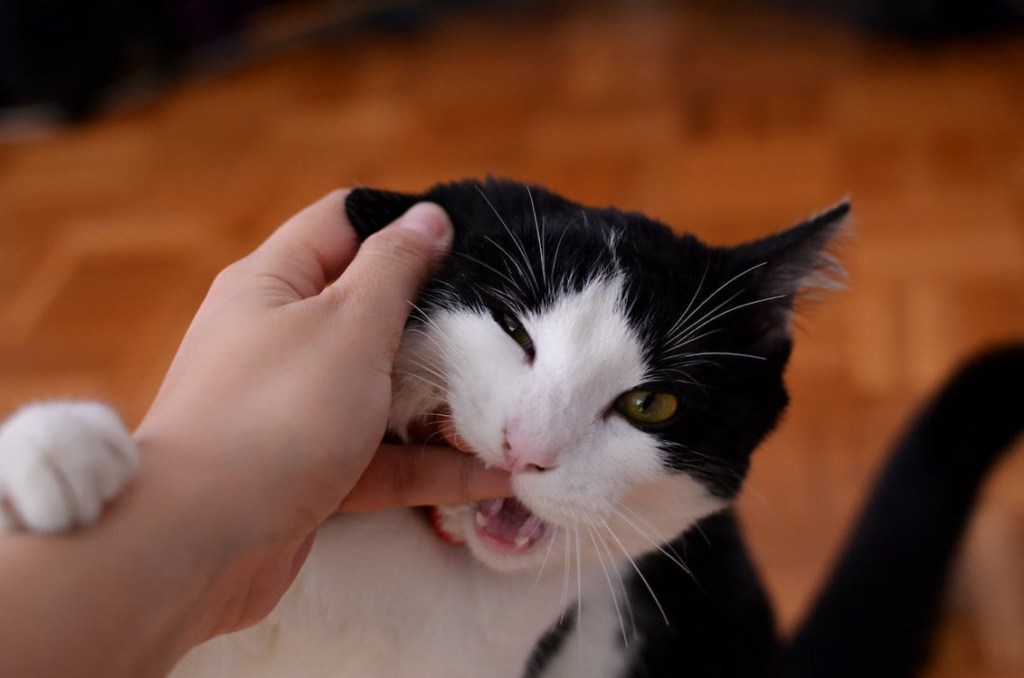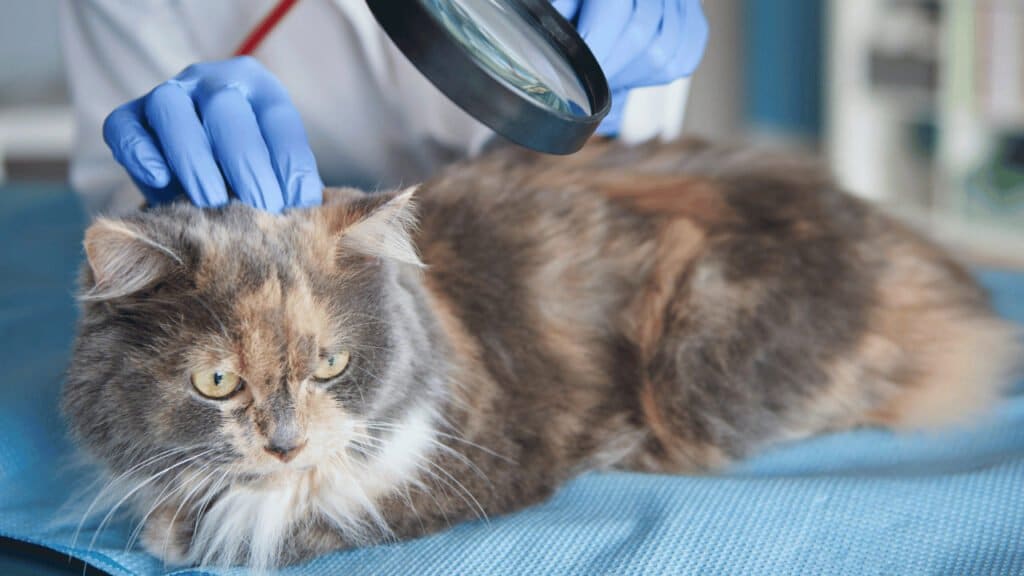Seeing your cat dry heave can be concerning. While sometimes it’s caused by harmless reasons like hairballs or eating too fast, it could also signal underlying health issues. Dry heaving, along with loss of appetite, lethargy, or abdominal pain, could indicate digestive issues like intestinal blockages from foreign objects or toxic substances.
It might also point toward liver disease or kidney problems. If your cat is experiencing dry heaving alongside a distended abdomen, vomiting, or seems weak and lethargic, seek urgent veterinary care. This could be a sign of a veterinary emergency like acute heart disease or severe intestinal blockage.
Why Is My Cat Dry Heaving?
Why your cat might be dry heaving is crucial for any cat parent. This symptom can be caused by a wide variety of health issues, ranging from minor conditions like hairballs and upset stomach to more severe problems such as liver disease, heart disease, or intestinal blockage. Common symptoms accompanying dry heaving include loss of appetite, abdominal pain, and nausea in cats.
These symptoms could indicate underlying conditions like kidney disease, inflammatory bowel disease, or respiratory infections. It’s essential to monitor your cat’s energy levels and seek veterinary attention if you notice persistent signs of distress. Frequent hairballs, spoiled food, and toxic substances can also trigger dry heaving.
If your cat shows signs of gastroenteritis, breathing difficulties, or a distended abdomen, an emergency vet visit may be necessary. Accurate diagnosis and timely medical advice are vital for addressing any health issues and ensuring your cat’s well-being.
Cat Dry Heaving and Vomiting
While seeing your cat dry heave or vomit can be alarming, it doesn’t always signal trouble. Hairballs, caused by self-grooming, are a common culprit, especially in longhaired felines. Similarly, an upset stomach from spoiled food can lead to vomiting.
However, be on the lookout for accompanying symptoms that might indicate a more serious issue. Loss of appetite, lethargy, and abdominal pain could point towards digestive problems like intestinal blockages or inflammatory bowel disease. Dry heaving alongside a distended abdomen, persistent vomiting, or a general lack of energy might signify underlying health issues like liver or kidney disease.
If your cat’s vomiting is frequent, accompanied by blood or a swollen abdomen, or they seem very unwell, seek immediate veterinary attention. This could be a sign of a veterinary emergency like acute heart disease or a severe blockage. Early intervention can make a big difference in your cat’s recovery.
When To Worry About Your Cat’s Dry Heaving
Cat dry heaving can be concerning, but in most cases, it’s harmless. However, there are underlying conditions that cat owners should be aware of. Here are some common reasons for dry heaving in cats:
- Furballs / Hairballs: The most frequent cause of dry heaving in healthy cats is furballs. When cats groom themselves, they ingest loose and dead hair. Most of this hair passes through the digestive tract, but sometimes it forms a hairball that the cat will vomit up. If your cat struggles to expel a hairball, it can lead to dry heaving. Rarely, unexpelled furballs can cause life-threatening blockages.
- Kidney Disease: Older cats often suffer from kidney disorders, leading to symptoms like dry heaving, nausea, and vomiting. Other signs include itchiness, depression, increased thirst, and pale gums. Acute kidney disease, caused by ingesting toxic substances, is a veterinary emergency.
- Gastroenteritis: Inflammation of the stomach or intestine can result in gagging, dry heaving, and vomiting. Cats may foam at the mouth while vomiting with an empty stomach. Gastroenteritis can be caused by bacteria, viruses, parasites, new food, or medication reactions.
- Heart Disease: Both acquired and congenital heart disease are common in cats. Along with dry heaving, heart conditions may cause weakness, breathing difficulty, coughing, abdominal swelling, and abnormal heart rate.
Remember, if your cat experiences recurrent vomiting, refuses to eat, or shows signs of abdominal pain or swelling, contact your vet immediately. A blockage or obstruction is a serious emergency that requires urgent care.
What is Dry Heaving?
Dry heaving, sometimes called retching, is when your cat goes through the motions of vomiting without throwing anything up. Imagine forceful coughs or gagging with no resulting expulsion. Hairballs, a common woe for furry friends, can sometimes trigger dry heaving. It can also be caused by a mild stomach upset from something they shouldn’t have eaten.
However, dry heaving isn’t always harmless. If your cat also exhibits loss of appetite, listlessness, or abdominal pain, it could signal a more serious issue like a blockage or digestive illness. So, while occasional dry heaving might not be a cause for immediate alarm, be mindful of your cat’s overall demeanor and seek veterinary attention if they seem unwell.
Why Dry Heaving Occurs in Cats
Dry heaving in cats can stem from a variety of health issues, often signaling an underlying problem. Common reasons include the ingestion of spoiled food or toxic substances, leading to an upset stomach and abdominal pain. The presence of a foreign body in the digestive tract or an intestinal blockage can also cause dry heaving and may require urgent care.
Diseases in cats such as liver disease, acute kidney disease, and heart disease can present symptoms like nausea, loss of appetite, and lack of energy. Respiratory issues, bacterial or viral infections, and systemic diseases are additional contributors. Cats with chronic conditions, such as inflammatory bowel disease or congenital heart disease, might experience recurrent vomiting and dry heaving.
Cat parents need to seek veterinary attention for an accurate diagnosis and appropriate hairball remedy. Observing signs like a distended abdomen, abnormal heart rate, or severe health issues should prompt a visit to an emergency vet for immediate care.
What To Do If Your Cat Is Dry Heaving
Seeing your cat dry heave can be concerning, but the first step is to stay calm and assess the situation. Occasional dry heaving might not be a big deal, especially if your cat seems otherwise normal. If it seems like a hairball causing the issue, there are hairball remedies available that can help.
However, be mindful of other signs. Loss of appetite, listlessness, or abdominal pain alongside dry heaving warrants a trip to the vet. These could signal a blockage or a more serious condition.
For mild cases, try withholding food for a few hours and offering small amounts of water to avoid dehydration. If your cat seems okay after a while, you can reintroduce food gradually.
If the dry heaving persists or worsens, or your cat seems very uncomfortable, don’t hesitate to contact your veterinarian. Early intervention can make a big difference, especially with underlying health concerns. Remember, it’s always better to be safe than sorry!
What Can Cause Dry Heaving Without Vomiting?
Dry heaving, also known as retching, refers to the sensation of vomiting without actually expelling any substance. While it can be distressing, it’s usually temporary and treatable. Here are some common causes of dry heaving:
- Excessive Exercise: Intense physical activity can cause your diaphragm to contract, leading to dry heaving. It’s essential to avoid exercising on a full stomach and gradually build your tolerance to activity to reduce the risk of exercise-induced retching.
- Alcohol Consumption: Binge drinking or consuming large amounts of alcohol can trigger dry heaving. If you experience this, consider limiting your alcohol intake and avoid drinking on an empty stomach.
- Gastroesophageal Reflux Disease (GERD): GERD causes symptoms like heartburn and acid reflux. It can lead to partially digested food regurgitation and discomfort while swallowing or breathing, which may result in dry heaving. Lifestyle changes, such as eating smaller meals and avoiding spicy or greasy foods, can help manage GERD symptoms.
- Medication Side Effects: Some medications, especially those for anxiety and depression, may cause nausea and vomiting. If you suspect your current medication is causing dry heaving, consult your doctor for potential alternatives.
Remember that persistent or severe dry heaving warrants medical attention. If you experience prolonged symptoms, consult a healthcare professional to identify the underlying cause and receive appropriate treatment.
Causes of Cat Dry Heaving
Dry heaving in cats can be triggered by numerous underlying issues. Common causes include ingesting spoiled food or toxic substances, which can lead to an upset stomach, abdominal pain, and nausea in cats. Issues within the digestive tract, such as a foreign body or intestinal blockage, are serious concerns that might require urgent care and veterinary attention.
Diseases in cats, including liver disease, heart disease, and acute kidney disease, can present symptoms like loss of appetite, lack of energy, and abnormal heart rate. Recurrent vomiting and dry heaving are often linked to conditions such as inflammatory bowel disease and congenital heart disease. Gastroenteritis in cats can also cause these symptoms.
Observing signs like a distended abdomen or severe health issues should prompt a visit to an emergency vet. Frequent hairballs, buildup of dead hair, and reactions to medications are additional common reasons for dry heaving. Seeking medical advice for an accurate diagnosis and appropriate treatment is essential for maintaining your cat’s health.
Why Is My Cat Dry Heaving But Acting Normal?
Seeing your cat dry heave can be alarming, but don’t jump to conclusions if they seem otherwise happy and healthy. Occasional dry heaving might be caused by harmless reasons like:
- Hairballs: Frequent self-grooming leads to swallowed fur, which can irritate the stomach and cause dry heaving. Longhaired cats are more prone to this.
- Upset Stomach: Eating something they shouldn’t have, like spoiled food or a houseplant, can trigger a mild stomach upset and dry heaving.
If your cat’s dry heaving is infrequent and they’re acting completely normal with usual energy and appetite, you might not need immediate concern. However, monitor the situation closely. Here’s when to be cautious:
- Frequency: Frequent dry heaving, even without other symptoms, can indicate an underlying issue.
- Accompanying Signs: If dry heaving coincides with loss of appetite, lethargy, abdominal pain, or vomiting, seek veterinary attention. These could signal a blockage, inflammatory bowel disease, or other serious conditions.
- Severity: If the dry heaving is intense, or prolonged, or your cat seems distressed, seek veterinary advice promptly.
Early intervention is crucial for diagnosing and treating potential health issues. Remember, “better safe than sorry” applies to your furry friend too! If you’re unsure, consulting your veterinarian is always the best course of action. They can provide a proper diagnosis and recommend the best course of treatment to keep your feline companion happy and healthy.
For More Information
We have a ton of information regarding what foods, from popular snacks to fruits, are healthy or harmful for your dog. You might also be interested in “why is my cat breathing fast“
Conclusion
Dry heaving in cats is a concerning symptom that warrants careful attention from pet owners. It can be caused by a variety of underlying health issues, ranging from minor irritations like hairballs to more serious conditions such as liver or kidney disease. Accompanying symptoms such as loss of appetite, abdominal pain, and lack of energy should not be overlooked.
Seeking prompt veterinary care is crucial to accurately diagnose the underlying cause and provide appropriate treatment. By monitoring your cat’s behavior closely and acting quickly to address any concerns, you can help ensure their health and well-being. Remember, early intervention is key to preventing complications and promoting a speedy recovery for your furry friend.













